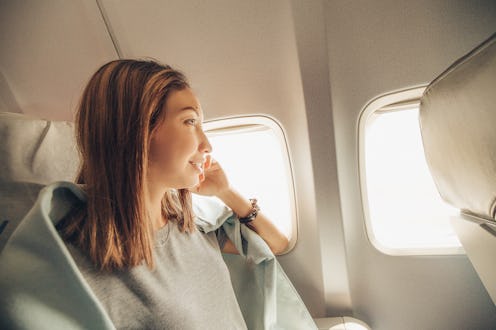(Living)
CBD Could Be A Remedy For Your Flight Anxiety — But There's A Caveat

There's a lot to look forward to when taking a trip, from checking out the historic sites to enjoying the comforts of a bed that's decidedly nicer than your own. But getting there isn't always a breeze. Between the discomfort and dryness that can take place mid-flight, the sleeplessness you might suffer from crossing into a different time zone, and the panic that sets in for those who deal with flight anxiety, traveling can also kind of be a pain — sometimes literally. That said, is CBD for travel a worthy solution? According to medical experts, it just might be — but there are a few things you should know before looking to this buzzy wellness trend to solve all your in-flight woes.
Between the tinctures, gummies, water, and even more products touting CBD's powers (supplements, superfoods, and more), you must be living under a rock these days if you haven't heard of its claims — let alone tried it. Among the most popular uses of CBD are treating anxiety and stress, easing aches and pains, and soothing skin, so it doesn't seem so unusual to think that it could work as an aid to some of the negative effects of travel, like jet lag, muscle cramping, or plane panic.
Also, as with all CBD and cannabis-related products, be sure to learn the legalities of the products in your particular state or place of travel, as many states haven't quite jumped on the marijuana bandwagon just yet. As for flying with CBD, according to the TSA site, "Marijuana and certain cannabis infused products, including some Cannabidiol (CBD) oil, remain illegal under federal law except for products that contain no more than 0.3 percent THC on a dry weight basis or that are approved by FDA." Be sure to check the ingredients facts on your CBD product of choice to see if it meets the federal requirements before tossing in your carry-on.
While Dr. Bonni Goldstein, medical advisor for Weedmaps and owner and Medical Director of Canna-Centers Wellness & Education, notes that there is still much to be learned and examined about the claims and uses of CBD, she acknowledges that it's also pretty darn helpful when it comes to certain issues — and that includes some of the aforementioned travel-related ones. But there are a few caveats. Ahead, find feedback from Dr. Goldstein and a few other medical professionals to learn how CBD can — and can't — benefit you on your next trip.
For Flight Anxiety
"CBD can be helpful for travel anxiety because, by activating the endocannabinoid system, it dampens the stress response," says Dr. Kate Denniston of Los Angeles Integrative Health. "CBD has also been shown to reduce activity in the amygdala, an area of the brain that is part of our threat detection system, which can induce the body's flight or fight response. By modulating neural activity in the body's threat response system, our perception of threats and stressors changes."
And while Dr. Goldstein agrees that those who experience stress during travel could benefit, she mentions that, before testing it out on a flight, first make sure it works for you in an everyday setting. "Like all substances (e.g. pharmaceuticals, homeopathic remedies, even foods), everyone responds uniquely to CBD," she says. "The general rule of thumb is, when trying CBD for the first time, try it at home first to see how much dosing (read: the amount) you should take to achieve your desired effects, before you step on the plane."
For Dry Skin/Joint Pain/Swelling
This one is sort of a maybe/yes/no. "Swelling while you travel could be a result of poor circulation not necessarily inflammation, and dry skin isn't a result of inflammation so CBD may not have any benefit in this area, but the topical administration of CBD ointment is a safe and non-invasive solution that can improve skin irritation, especially on inflammatory background," says Dr. Allen Morgan, women's health specialist and co-founder of Maxine + Morgan.
And Dr. Denniston agrees. "CBD oil may help soothe dry, irritated skin by delivering fatty acids, antioxidants, and anti-inflammatory compounds to the skin," she adds. "The fatty acids in topical CBD oil may help strengthen the skin's natural barrier and improve dry skin."
For Jet Lag/Sleep
First things first: CBD does not necessarily help you sleep. "One of biggest myths about CBD is that it is a sleep aid, as CBD in lower doses is actually an alerting and stimulating compound, though it does demonstrate sedating/calming effects in higher doses," explains Dr. Goldstein. Instead, CBD can be used if your sleeplessness is a result of stress or anxiety specifically. "CBD can improve sleep by dampening excitatory neurotransmission in the brain, which often keeps us awake," offers Dr. Denniston. "Reducing excitatory transmission in the brain can help us fall asleep faster, enabling us to adjust to a new time zone."
For this use, Dr. Denniston specifically points to tinctures as a good vehicle for CBD. "Tinctures are [...] are fast acting and you can control how much you want to take," she says. "I like [them] because they allow you to take the smallest dose possible and work your way up."
*Readers should note that laws governing cannabis, hemp and CBD are evolving, as is information about the efficacy and safety of those substances. As such, the information contained in this post should not be construed as legal or medical advice. Always consult your physician prior to trying any substance or supplement.
This article was originally published on